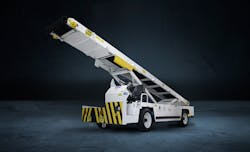GM Opens Broad Application of EV Component Sets
DETROIT – Guided by its vision of a world with zero crashes, zero emissions and zero congestion, General Motors announced today its strategy to offer EV technology beyond its own portfolio and automotive applications more broadly, one component at a time. This approach will enable GM to expand its reach to a larger, more diverse group of commercial customers, helping organizations meet the growing demand for zero-emissions technology while achieving their own sustainability targets.
“GM has an established strategy, network of integrators and co-development agreements to apply an extensive array of components and solutions to a broad range of customers and use cases,” says Travis Hester, GM vice president of Electric Vehicle Growth Operations. “As companies across many industries look to reduce their environmental impact, GM is uniquely positioned to serve as a leader not only through exciting new EVs across our brands, but through additional technology applications, and we look forward to bringing customers – existing and new – along with us on our zero-emissions journey.”
The company estimates that the total addressable market for electrification components could near $20 billion by 2030, as a growing number of industries introduce their own emissions reduction goals.
Examples of initial EV component sets that GM will begin introducing include:
- Chevy Performance and Aftermarket: The upcoming Electric Connect and Cruise eCrate Package represents an exciting opportunity for GM to extend EV technology to the aftermarket, enabling customers to work with qualified installers through GM’s electric specialty vehicle modifier (eSVM) program who have been properly trained to replace a vehicle’s traditional internal combustion engine with a fully electric propulsion system. GM’s demonstrated proof-of-concept electric conversion vehicles include the E-10 pickup, K-5 Blazer-E, eCOPO Camaro, and Project X built in collaboration with Cagnazzi Racing’s eCrate Solutions Group. Now, an electrified 1972 El Camino SS, developed with Lingenfelter Performance Engineering in Brighton, Michigan, represents the first independent installation of the concept eCrate package, and boldly ushers in the next generation of EV components from Chevrolet Performance as the program prepares to launch in 2022.
- GM Powered Solutions: GM Powered Solutions will begin introducing tailored electric component sets and will leverage the resources of GM’s Powered Solutions team to actively identify opportunities that could benefit from electrification and will work to strategically integrate the latest EV technology into custom applications. This effort will extend the company’s commitment to an all-electric future through its current GM Marine, On-Highway, Off-Highway and Industrial segments and help enable additional enterprises to reach their own emissions targets utilizing GM EV components and systems. Additional information about GM Powered Solutions is available here.
- Ground Support Equipment: In a strategic collaboration with Textron Ground Support Equipment Inc., a Textron Inc. company, GM will provide EV components to electrify Textron GSE’s TUG line of baggage tractors, cargo tractors and belt loaders. GM will provide technology to Powertrain Control Solutions, which will integrate the components into lithium-ion electric powertrains for TUG equipment, assisting in the electrification of ground support equipment for use in airports globally.
- Marine Propulsion: In addition to supporting existing GM Marine customers, GM’s strategic investment in Seattle-based electric watercraft company Pure Watercraft represents an opportunity to bring EV technology to the marine industry and help preserve enjoyment of the outdoors for future generations. Together, the two companies will develop and commercialize battery electric watercraft to accelerate the transition to electric mobility.
Electrification components are part of GM’s effort to extend the performance and benefits of zero-emissions technology to new industries and serve as a natural extension of GM’s growth strategy.
Additional extensions include:
- GM’s HYDROTEC fuel cell commitments and co-development agreements
- Ultium Platform applications and co-development agreements
- Ultium Charge 360
- BrightDrop
- Ultifi software platform
Leveraging over 100 years of engineering and manufacturing expertise, GM intends to apply the learnings from one component set to the development of others, resulting in a larger portfolio of product offerings across a far-reaching set of applications.
In the future, the company will look to implement the latest in EV technology, regardless of battery generation or chemistry, to electrify a wide range of applications across industries.
“Our customers will benefit from GM’s vast network of resources, support and experience as an innovator in the electrification space” Hester said. “As we advance our Ultium Platform and other zero-emissions technologies, we anticipate smaller, more affordable, and more flexible components and offerings over time.”
Additional information and specific product applications for each opportunity will be disclosed at a later date.
